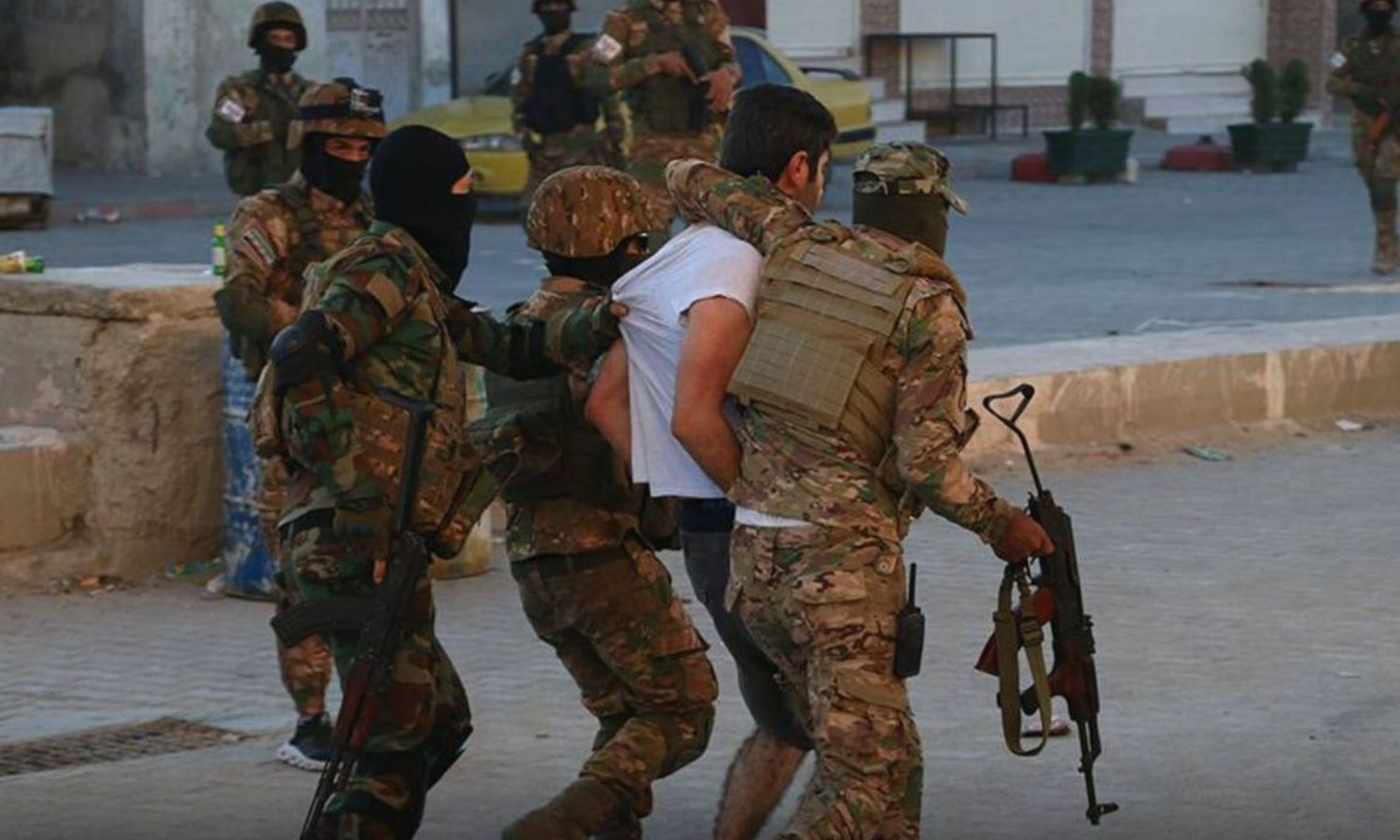



Enab Baladi – Hassan Ibrahim
Cases of arrests of civilians or activists and humanitarian and relief workers carried out by opposition factions and security services in their areas of control in northwestern Syria have been repeated in recent months.
Some cases of arbitrary arrests carried out by Hayat Tahrir al-Sham (HTS) or factions of the Turkish-backed Syrian National Army (SNA) are being carried out without judicial warrants, with no lawyer allowed, amid numerous demands for the release of detainees.
Human rights organizations and networks continue to document several arrests by SNA factions that control the northern and eastern countryside of Aleppo and the cities of Tal Abyad and Ras al-Ayn, and HTS, which has military influence in Idlib governorate and part of the western countryside of Aleppo and Latakia and the al-Ghab Plain, northwest of Hama.
On 31 August 2018, HTS arrested a medical staff at his workplace in a medical facility in the village of Kafr Karmin in the western countryside of Aleppo, as documented by the Syrian Network for Human Rights (SNHR), amid calls from several activists for his release.
Activists on social media said that the reason for the arrest of Mastou al-Omar, known as Mastou al-Assli, was a Facebook post in which he said he would hold a party in the village similar to the celebration of Christians in Idlib on St. Anna’s Day, addressing the al-Atarib police.
Mastou al-Omar is considered one of the first to rebel against the Syrian regime in the western countryside of Aleppo, according to activists. He was previously working within the ranks of the Army of Mujahideen (Jaysh al-Mujahideen) faction of the former Free Syrian Army (FSA). He then left military work and joined the medical staff as a paramedic.
Enab Baladi reached out to HTS’ media office to inquire about the reasons for the arrest but did not receive a reply until the moment this report was published.
Under the heading “Security campaign,” the village of Kokan in Afrin, the northern countryside of Aleppo, witnessed security tensions and clashes between the military police and persons belonging to the Mawali tribe after said police entered the village to arrest a number of persons.
The clashes that began on 27 August were accompanied by a military alert until the dispute between the two parties ended on the 31st of the same month, amid panic and fear among the residents of the area.
After the end of the clashes, the Ministry of Defense of the Syrian Interim Government (SIG), the political umbrella of the Syrian National Army (SNA), stated that it had arrested a number of wanted persons within “armed drug-trafficking groups” without any human losses.
In August, the Syrian Network for Human Rights (SNHR) documented at least 186 arbitrary arrests (detentions), including 17 children and 11 women by parties to the conflict in Syria, 139 of which turned into enforced disappearances.
SNHR recorded that 43 persons, including four children and six women, had been arrested by SNA factions, 26 of them were released, and 17 were forcibly disappeared.
HTS arrested nine people out of the total number, including a child. It released three of them and made six people disappear forcibly.
The factions or security services in northwestern Syria periodically announce security operations, address some problems such as clashes, and repeatedly carry out campaigns targeting elements, networks, and cells that “threaten the region’s security,” as well as campaigns against drug traffickers and dealers.
The practice of arbitrary arrests by these factions without a warrant or legal procedures led them to face criticism and accusations, and these arrests stigmatized certain factions and gave them a reputation that still accompanies them.
Military analyst, Brigadier General Abdallah al-Assaad, told Enab Baladi that the situation of the factions in northwestern Syria is not governed by a combat training plan or monthly or annual organizational instructions, and they operate haphazardly without a clear plan.
Al-Assaad attributed the reason for the arbitrary arrests to the lack of a unified command to control factions’ actions; the majority of the arrests were either based on the thinking, moodiness, and personal opinions of certain leaders influencing the arrests or on reprisals.
Al-Assaad stated that the lack of coordination between military and civil institutions and those in the region, whether military police, civilian police, judicial bodies, or local councils, is one of the most important reasons for the chaotic arrests.
Some security operations are conducted without prior planning, cooperative organization, or coordination with civil councils and with people in the area whatsoever, according to al-Assaad, who indicated that the implementation of security operations is not a faction’s task.
Arrests continue despite reports by human rights organizations and recommendations that there should be a warrant and clear charges before arrests, as well as demonstrations and appeals after each case.
The military analyst put forward some available solutions to limit arbitrary arrests, namely the need for a security office run by a trained security officer with personnel and operating on clear bases and regulations within each faction or division.
One of the solutions is to form a unified general command, comprising departments and a chief of staff, based on military hierarchy and operating under a clear structure, such as the Ministry of Defense, whose task is to give all instructions and carry out no operations, whether arrests, search or security operations, except through the command of the staff and by the competent branches or departments.
if you think the article contain wrong information or you have additional details Send Correction